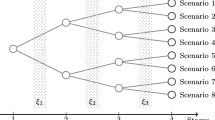Abstract
We consider the problem of selecting the best variable-value strategy for solving a given problem in constraint programming. We show that the recent Embarrassingly Parallel Search method (EPS) can be used for this purpose. EPS proposes to solve a problem by decomposing it in many subproblems and to give them on-demand to workers which run in parallel. Our method uses a sample of these subproblems for comparing strategies in order to select the most promising one to be used for solving the remaining subproblems. Each subproblem of the sample is solved with all the candidate strategies in parallel using a timeout that is twice the time of the best one. The selection of the strategy is then based on the Wilcoxon signed rank test. This test is able to deal with censored data caused by timeouts and makes no assumption on the solving time distribution. The experiments we performed on a set of classical benchmarks for satisfaction and optimization problems show that our method selects most of the time the best strategy. Our method also outperforms the portfolio approach consisting of running some strategies in parallel and is competitive with the multi armed bandit framework.
Access this chapter
Tax calculation will be finalised at checkout
Purchases are for personal use only
Similar content being viewed by others
Notes
- 1.
We do not claim that this computation is accurate. We present it only for understanding the intuitive idea.
- 2.
Roughly the activity is defined by the number of times the variables has been introduced in the propagation queue. The activity is increased at most by one for each decision.
- 3.
The weighted degree of a variable is defined by a counter associated with it. Each time a constraint fails, the counter of each variable involved in the constraint is increased by one.
References
Arbelaez, A., Hamadi, Y., Sebag, M.: Online heuristic selection in constraint programming. In: International Symposium on Combinatorial Search (2009)
Auer, P., Cesa-Bianchi, N., Fischer, P.: Finite-time analysis of the multiarmed bandit problem. Mach. Learn. 47(2–3), 235–256 (2002)
Birattari, M., Stützle, T., Paquete, L., Varrentrapp, K.: A racing algorithm for configuring metaheuristics. In: GECCO 2002: Proceedings of the Genetic and Evolutionary Computation Conference, New York, USA, 9–13 July 2002, pp. 11–18 (2002)
Boussemart, F., Hemery, F., Lecoutre, C.: Revision ordering heuristics for the constraint satisfaction problem. In: 1st International Workshop on Constraint Propagation and Implementation held with CP 2004 (CPAI 2004), pp. 9–43, Toronto, Canada, September 2004
Boussemart, F., Hemery, F., Lecoutre, C., Sais, L.: Boosting systematic search by weighting constraints. In: ECAI, vol. 16, p. 146 (2004)
Epstein, S.L., Freuder, E.C., Wallace, R.J., Morozov, A., Samuels, B.: The adaptive constraint engine. In: Van Hentenryck, P. (ed.) CP 2002. LNCS, vol. 2470, pp. 525–542. Springer, Heidelberg (2002)
Gagliolo, M., Schmidhuber, J.: Learning dynamic algorithm portfolios. Ann. Math. Artif. Intell. 47(3–4), 295–328 (2006)
Gay, S., Hartert, R., Lecoutre, C., Schaus, P.: Conflict ordering search for scheduling problems. In: Pesant, G. (ed.) CP 2015. LNCS, vol. 9255, pp. 140–148. Springer, Heidelberg (2015)
Gecode (2012). http://www.gecode.org/
Gomes, C.P., Selman, B.: Algorithm portfolios. Artif. Intell. 126(1–2), 43–62 (2001)
Hamadi, Y., Search, C.: From Algorithms to Systems. Springer (2013)
Hamadi, Y., Jabbour, S., Sais, L.: Manysat: a parallel SAT solver. JSAT 6(4), 245–262 (2009)
Haralick, R.M., Elliot, G.L.: Increasing tree search efficiency for constraint satisfaction problems. Artif. Intell. 14, 263–313 (1980)
Kjellerstrand, H.: My constraint programming blog (2016)
Kotthoff, L.: Algorithm selection for combinatorial search problems: a survey. arXiv preprint. arXiv:1210.7959 (2012)
Kotthoff, L.: Algorithm selection literature summary (2016). http://larskotthoff.github.io/assurvey
Lecoutre, C., Sais, L., Tabary, S., Vidal, V.: Last conflict based reasoning. In: ECAI, pp. 133–137 (2006)
Loth, M., Sebag, M., Hamadi, Y., Schoenauer, M.: Bandit-based search for constraint programming. In: Schulte, C. (ed.) CP 2013. LNCS, vol. 8124, pp. 464–480. Springer, Heidelberg (2013)
Michel, L., Van Hentenryck, P.: Activity-based search for black-box constraint programming solvers. In: Beldiceanu, N., Jussien, N., Pinson, É. (eds.) CPAIOR 2012. LNCS, vol. 7298, pp. 228–243. Springer, Heidelberg (2012)
MiniZinc (2012). http://www.g12.csse.unimelb.edu.au/minizinc/
Moore, D.S., McCabe, G.P., Craig, B.A.: Introduction to the Practice of Statistics: Extended Version. W.H. Freeman, New York (2009)
O’Mahony, E., Hebrard, E., Holland, A., Nugent, C., O’Sullivan, B.: Using case-based reasoning in an algorithm portfolio for constraint solving. In: Irish Conference on Artificial Intelligence and Cognitive Science, pp. 210–216 (2008)
Refalo, P.: Impact-based search strategies for constraint programming. In: Wallace, M. (ed.) CP 2004. LNCS, vol. 3258, pp. 557–571. Springer, Heidelberg (2004)
Régin, J.-C., Rezgui, M., Malapert, A.: Embarrassingly parallel search. In: Schulte, C. (ed.) CP 2013. LNCS, vol. 8124, pp. 596–610. Springer, Heidelberg (2013)
Régin, J.-C., Rezgui, M., Malapert, A.: Improvement of the embarrassingly parallel search for data centers. In: O’Sullivan, B. (ed.) CP 2014. LNCS, vol. 8656, pp. 622–635. Springer, Heidelberg (2014)
Rice, J.R.: The algorithm selection problem. Adv. Comput. 15, 65–118 (1976)
Vilím, P., Laborie, P., Shaw, P.: Failure-directed search for constraint-based scheduling. In: Michel, L. (ed.) CPAIOR 2015. LNCS, vol. 9075, pp. 437–453. Springer, Heidelberg (2015)
Lin, X., Hutter, F., Hoos, H.H., Leyton-Brown, K.: Satzilla: portfolio-based algorithm selection for sat. J. Artif. Intell. Res. 32, 565–606 (2008)
Acknowledgments
We would like to thank Guillaume Perez for his useful comments and for his help in the multi-armed bandit algorithm, and also the anonymous reviewer who made a lot of comments who helped us to improve this paper.
Author information
Authors and Affiliations
Corresponding author
Editor information
Editors and Affiliations
Rights and permissions
Copyright information
© 2016 Springer International Publishing Switzerland
About this paper
Cite this paper
Palmieri, A., Régin, JC., Schaus, P. (2016). Parallel Strategies Selection. In: Rueher, M. (eds) Principles and Practice of Constraint Programming. CP 2016. Lecture Notes in Computer Science(), vol 9892. Springer, Cham. https://doi.org/10.1007/978-3-319-44953-1_25
Download citation
DOI: https://doi.org/10.1007/978-3-319-44953-1_25
Published:
Publisher Name: Springer, Cham
Print ISBN: 978-3-319-44952-4
Online ISBN: 978-3-319-44953-1
eBook Packages: Computer ScienceComputer Science (R0)




